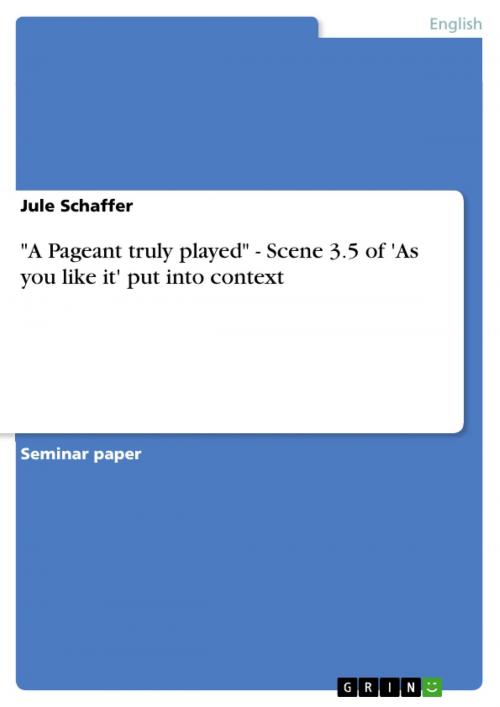'A Pageant truly played' - Scene 3.5 of 'As you like it' put into context
Scene 3.5 of 'As you like it' put into context
Fiction & Literature, Literary Theory & Criticism, British| Author: | Jule Schaffer | ISBN: | 9783638780261 |
| Publisher: | GRIN Publishing | Publication: | May 12, 2007 |
| Imprint: | GRIN Publishing | Language: | English |
| Author: | Jule Schaffer |
| ISBN: | 9783638780261 |
| Publisher: | GRIN Publishing |
| Publication: | May 12, 2007 |
| Imprint: | GRIN Publishing |
| Language: | English |
Seminar paper from the year 2006 in the subject English Language and Literature Studies - Literature, grade: 1,0, University of Cologne (English Seminar), course: Einführungsseminar Literaturwissenschaft Teil B, language: English, abstract: There is much literature about Shakespeare today, exploring many facettes of 'As you like it' and discovering many more all the time. This paper focuses on the main points I think relevant for the particular scene 3.5., put in the context of the play. [...] A pageant truly played between the pale complexion of true love And the red glow of scorn and proud disdain [...] (As you like it: 3.4.47-49) As such describes Corin the following scene 3.5., in which a madly in love Silvius hopelessly woos his beloved Phoebe, a 'proud disdainful shepherdess,' (3.4.45). The scene is a play within a play and Rosalind herself decides to 'prove a busy actor' (3.4.55) in this play. The scene is central to As you like it and seems to incorporate many of the images and ideas generally portrayed throughout the play. To start off, the paper gives a broad overview of critical reception and performance history. Both of these points will be illustrated by focusing on a few examples of the main critical voices and performances. Next, we will specifically look at scene 3.5., critically analysing it under the heading of the following ideas. One of the main themes underlying this sequence is the use and mocking of literary pastoral, along with various representations of love and mimetic desire. Phoebe's sudden eruption of feeling for Rosalind/ Ganymede also leads to the necessary consideration of the heroine's disguise and its roots and effects on the different levels of acting. In a last step then, the paper brings this theoretical analysis to a more practical level and looks at ways in which the ideas worked out in chapter 4. could be visualised on stage.
Seminar paper from the year 2006 in the subject English Language and Literature Studies - Literature, grade: 1,0, University of Cologne (English Seminar), course: Einführungsseminar Literaturwissenschaft Teil B, language: English, abstract: There is much literature about Shakespeare today, exploring many facettes of 'As you like it' and discovering many more all the time. This paper focuses on the main points I think relevant for the particular scene 3.5., put in the context of the play. [...] A pageant truly played between the pale complexion of true love And the red glow of scorn and proud disdain [...] (As you like it: 3.4.47-49) As such describes Corin the following scene 3.5., in which a madly in love Silvius hopelessly woos his beloved Phoebe, a 'proud disdainful shepherdess,' (3.4.45). The scene is a play within a play and Rosalind herself decides to 'prove a busy actor' (3.4.55) in this play. The scene is central to As you like it and seems to incorporate many of the images and ideas generally portrayed throughout the play. To start off, the paper gives a broad overview of critical reception and performance history. Both of these points will be illustrated by focusing on a few examples of the main critical voices and performances. Next, we will specifically look at scene 3.5., critically analysing it under the heading of the following ideas. One of the main themes underlying this sequence is the use and mocking of literary pastoral, along with various representations of love and mimetic desire. Phoebe's sudden eruption of feeling for Rosalind/ Ganymede also leads to the necessary consideration of the heroine's disguise and its roots and effects on the different levels of acting. In a last step then, the paper brings this theoretical analysis to a more practical level and looks at ways in which the ideas worked out in chapter 4. could be visualised on stage.















